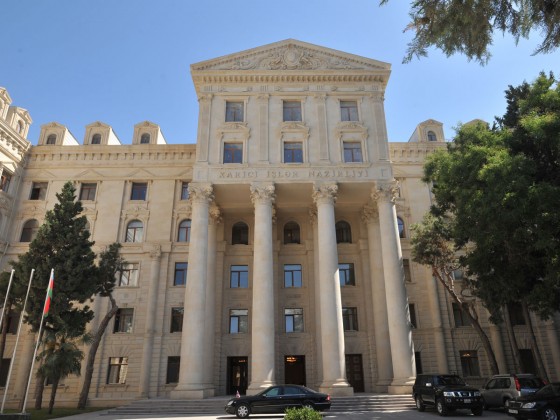
Armenia bears responsibility to international community for grossly violating the international humanitarian law, the head of the press service of Azerbaijani Foreign Ministry, Hikmet Hajiyev told Trend Sept. 2.
“Armenian military’s firing from Azerbaijan’s occupied territories at civilians taking part in a wedding ceremony in Terter district’s Gapanli village and as a result wounding three people, including a small child, is another gross violation of international humanitarian law principles by Armenia,” he said.
On Sept. 1 Armenian armed forces opened fire at a wedding tent in the Terter district of Azerbaijan, as a result three people got wounded.
Hajiyev said international humanitarian law prohibits deliberate attacks on civilians during armed conflicts.
Under international humanitarian law, such deliberate acts of Armenian armed forces are war crimes, he added.
“This proves once again that Armenia is absolutely far from fulfilling its commitments,” said Hajiyev.
He added that the killing of civilians has become something common for the civilian and military leadership of Armenia, which committed such a crime against humanity as the Khojaly genocide.
“Back on March 8, 2011, nine-year-old Fariz Badalov was killed as a result of a sniper fire by Armenian armed forces,” Hajiyev recalled.
He added that such an irresponsible and criminal behavior of Armenia, including the last incident, must be condemned by international community.
“Intentional violations of ceasefire by Armenia, provocations on contact line, that country’s provocative policy, in particular holding of events in Khankendi with involvement of political leadership from Yerevan under the guise of “independence” of the criminal regime created in the occupied Azerbaijani territories, and holding of “election” to “local authorities” once again show that the true goal of that country is to continue the occupation of Azerbaijani territories and keep the current status quo,” said Hajiyev.
He added that the last incident, which is a war crime of Armenia, will be brought to the attention of international organizations.
The conflict between the two South Caucasus countries began in 1988 when Armenia made territorial claims against Azerbaijan.
As a result of the ensuing war, in 1992 Armenian armed forces occupied 20 percent of Azerbaijan, including the Nagorno-Karabakh region and seven surrounding districts.
The two countries signed a ceasefire agreement in 1994. The co-chairs of the OSCE Minsk Group, Russia, France and the US are currently holding peace negotiations.
Armenia has not yet implemented the UN Security Council’s four resolutions on the liberation of the Nagorno-Karabakh and the surrounding regions.
Edited by SI
—
Follow the author on Twitter: @Asebaa
Trend
